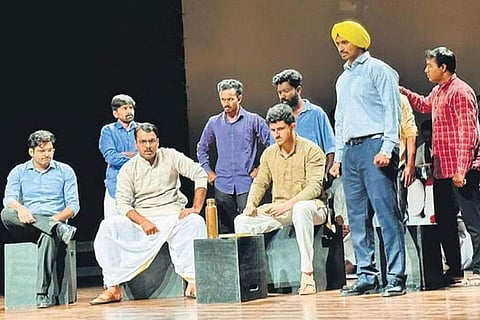
- LIFESTYLE
- FASHION
- FOOD
- ENTERTAINMENT
- EVENTS
- CULTURE
- VIDEOS
- WEB STORIES
- GALLERIES
- GADGETS
- CAR & BIKE
- SOCIETY
- TRAVEL
- NORTH EAST
- INDULGE CONNECT

More than 90 years after his hanging by the British, socialist revolutionary Bhagat Singh still remains large in public memory. But apart from his involvement in various plots against the British establishment, and later his execution, many know little about Singh.
On the occasion of India’s 77th Independence day, city-based theatre troupe Theatrenama is staging a play Gagan Damama Bajyo, on Singh’s life and his journey from a common man into a legend.
“Everyone has heard of Bhagat Singh in India, but what most people associate with him is that of a revolutionary, martyr but nothing beyond. We wanted to explore the man behind the legend and showcase his human side. What his life was like before he got into the freedom struggle. Furthermore, Bhagat Singh was just 23 when he was executed by the British. These days, when our youngsters are struggling with rampant mental health issues, we thought it would be an apt story to inspire them,” says Aashish Rana, founder of Theatrenama and director of the play.
The play, written by veteran actor-playwright Piyush Mishra, goes into the many aspects of Singh’s life, beyond his patriotism and struggle of azaadi. “It explores some lesser-known aspects of Singh’s life. For instance, not many people know that he was engaged before he gave up everything in his quest for azaadi. I think the people who come to watch the play will certainly be surprised on more than one occasion,” says Rana, adding that the musical play also features around 11 songs.
Deeply influenced by ideas from Bolshevism and anarchism, Bhagat Singh was a leading figure within the militant resistance to British rule in the 1920s. And unlike most popular tellings, where his political beliefs are largely overlooked, Gagan Damama Bajyo explores Singh’s socio-political convictions. “Bhagat Singh was someone who envisaged a world where there was no difference between the rich and the poor. His idea of independence wasn’t just freedom from the British. He wanted a world where everyone was equal.
He made it clear that even if we got independence from Britain, nothing would change for millions of Indians. I think largely that has remained true to this day,” says Rana, adding “I hope the audiences will leave the auditorium with a different mindset that they originally came in with.”